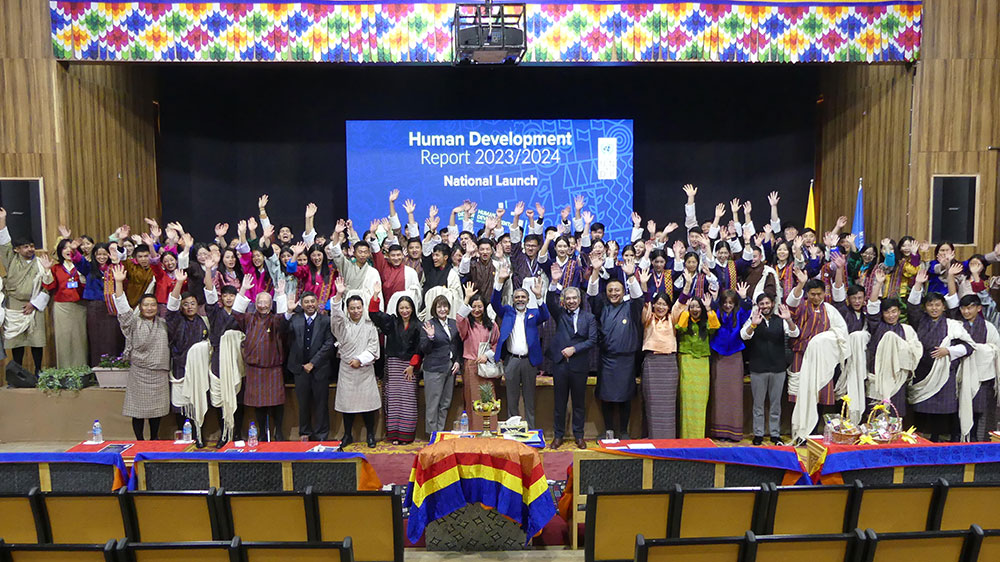YK Poudel
Bhutan’s ranking on the Gender Inequality Index in 2022 was 80th, showing an improvement from its previous position of 98th in 2021. The index value decreased from 0.415 in 2021 to 0.334 in 2022, indicating progress in reducing gender inequality.
The Gender Inequality Index (GII) is a measure of gender disparities in a country, considering factors like reproductive health, empowerment, and labour market participation.
Global inequality is rising after 20 years of convergence. From 2020, the gap between the richest and poorest countries has begun to widen.
According to the Human Development Index (HDI) report for 2023-2024, titled “Breaking the Gridlock: Reimagining Co-operation in a Polarized World”, by the UN Development Programme (UNDP), progress began to recover in 2022 after sharp declines in 2020 and 2021. The report projected that global development would reach record highs in 2023.
The report was launched by the Minister of Foreign Affairs and External Trade (MoFAET), DN Dhungyel, on April 3. The event was attended by the Resident Representative of UNDP, Mohammad Younus, the Resident Coordinator of UN Bhutan, Karla Robin Hershey, government and UN officials and students.
Lyonpo DN Dhungyel said that the UNDP’s report serves as a valuable tool, promoting ideas and influencing policy changes to advance human development globally. “Multilateralism is a key to addressing regional and global challenges—every country has a role to play in reshaping global co-operation.”
“Bhutan’s 13th Plan aims to achieve a healthy, prosperous, and secure Bhutan by 2034—placing an emphasis on social development with social cluster forming one of the four key clusters,” Lyonpo said.
Mohammad Younus said that 2022 observed the highest number of state-based armed conflicts since World War II, and the highest number of battle-related deaths since 1984, including increased civilian fatalities.
“Even before the outbreak of recent conflicts in the Middle East and Africa, approximately 1.2 billion people, constituting 15 percent of the total population, were affected,” he said. “Policy intervention, political polarisation, global cooperation, and technological convergence are imperative in modern times to fulfill the shared commitment of the SDG 2030 Agenda.”
Nearly two-thirds of the countries show an increase in polarisation, leaving behind the poorest and weakest members of the international community, he remarked. The report, he said, would serve as a valuable statistical asset for the upcoming ‘UN Summit of the Future’ scheduled for September this year.”
Findings
At the midpoint of the 2030 Agenda on Sustainable Development, advancement has halted or reversed for 30 percent of the Sustainable Development Goal (SDG) targets, while progress remains inadequate or insufficient for another 50 percent of them.
In Bhutan, women occupy only 15.7 percent of the seats in parliament. Additionally, their contribution to the labour force stands at 53.5 percent, significantly lower than the male contribution of 73.5 percent.
Globally, Denmark, Norway, and Switzerland are at the forefront of the Gender Inequality Index rankings, demonstrating relatively lower levels of gender inequality. Conversely, Yemen and South Sudan rank the lowest on this index, indicating higher levels of gender disparity within these nations.
Economically rich nations are witnessing unprecedented levels of human development, reaching new heights. Meanwhile, a significant portion of the world’s poorest countries continues to lag behind, failing to surpass their pre-crisis levels of progress.
The report indicates that the recovery remains incomplete, as projections for 2023 reveal that over a quarter of the world’s countries have a Human Development Index (HDI) value below their pre-2019 levels.
“The recovery is unequal, leaving the poorest countries behind. While all OECD countries have recovered from the 2020-2021 reversal in human development, among Least Developed Countries, only one in two countries have recovered their already low pre-crisis HDI level,” stated the report.
The consequences of mishandling interdependencies are significant. The increasing impact of climate change on populations, recent outbreaks of violent conflicts in various regions, and their potential escalation into longer-term and larger-scale conflicts indicate a heightened level of threats that are crossing national borders.
Looking ahead
To break the gridlock and enhance collective action, it’s recommended to focus on narrowing agency gaps, overcoming political polarisation, and fostering international co-operation.
There is also a need for the development community to pay closer attention to empowering individuals to shape their own development trajectories.
Global collaboration is essential to address mistrust and populism, facilitating national, regional, and global cooperation to overcome obstacles.
Tackling inequality and addressing challenges to human development are crucial components of this collaborative effort.


